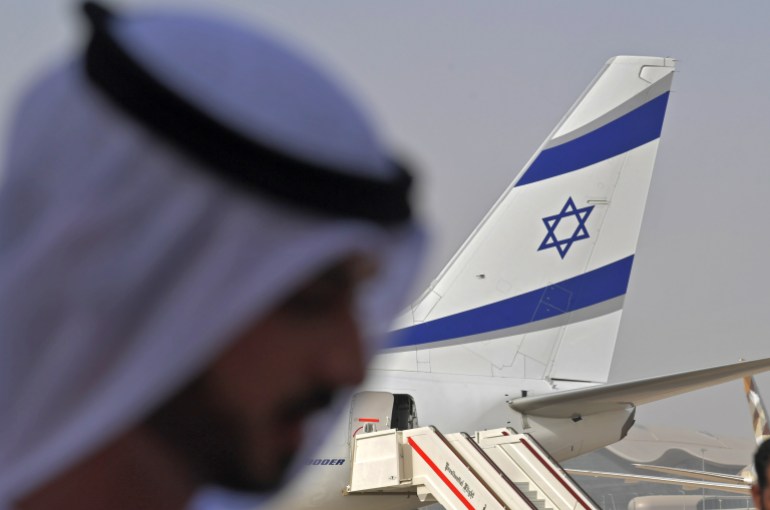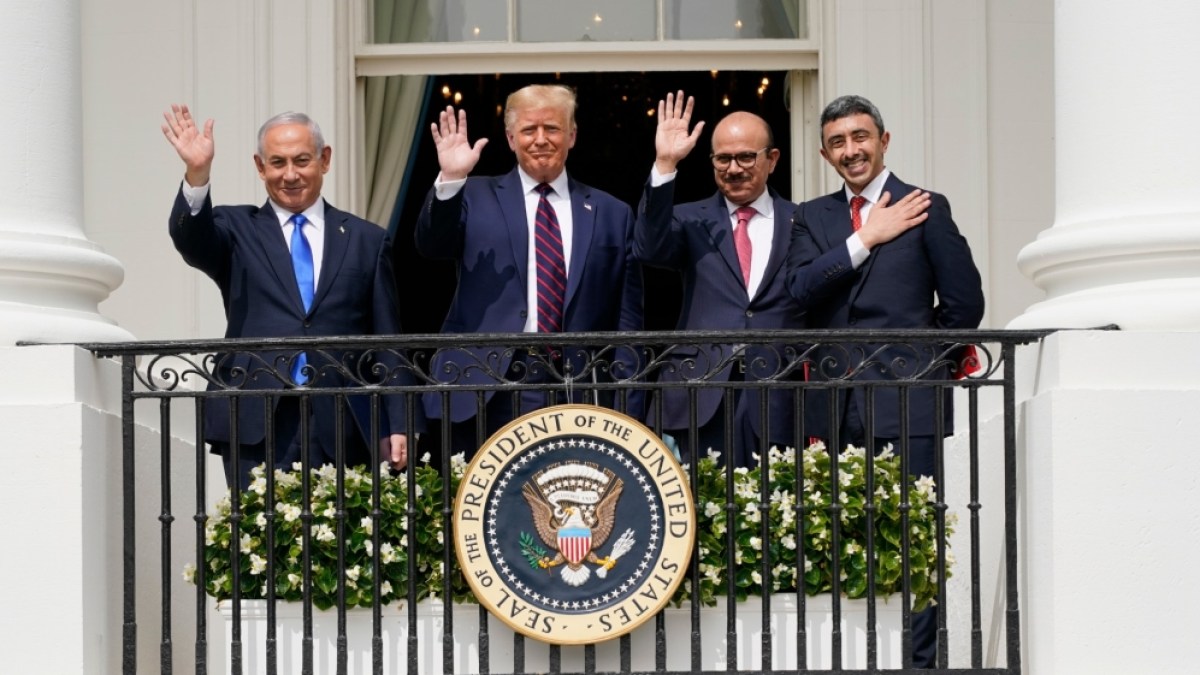Three years ago, the United States mediated an agreement between the United Arab Emirates, Bahrain and Israel, promising to normalise ties between these Arab Gulf states and Israel.
Since formalising the Abraham Accords in September 2020, the UAE and Israel have deepened their relations across a number of economic domains, as well as defence. Months after the two Arab nations signed on, two more joined the accords, Morocco and Sudan, and it seemed like the US was possibly on track to sign up even more Arab countries.
But with the current far-right Israeli government, some believe that the accords’ expansion has frozen, at least for now. And three years on, the UAE is facing challenges in working with Israel’s most extreme government ever.
Contending with Israel’s political landscape
The UAE sees itself as a trendsetter in the region, with an independent foreign policy aimed at advancing its national interests.
And it did benefit from the accords, with 450,000 Israelis visiting the UAE between January 2021 and January 2023 and Israeli companies doing business in the Gulf country as well.
“To a substantial number of [Israeli] tourists … [the normalisation] was positive as it [allowed] non-dual citizens to explore new countries and shortened air travel when countries opened their airspace,” Mira al-Hussein, an Emirati sociologist and postdoctoral researcher at Oxford University, told Al Jazeera.
“For Israeli businessmen, too, the Gulf is a new market … For many Israelis unhappy with the economic woes of their country, the UAE became a destination for job seekers,” she added.
But dealing with an Israeli government made up of Bezalel Smotrich, Itamar Ben-Gvir, and other far-right hardliners who came to power last year is tough for Abu Dhabi.
“The coalition that the UAE signed the accords with are not the people or system the UAE is currently dealing with. This … disrupts any continuity and familiarity,” al-Hussein said.
Against the backdrop of increased Israeli violence against Palestinians under this government, the UAE has condemned Israel’s violations of basic Palestinian rights.
For example, in April 2022, the UAE’s minister of state for international cooperation, Reem bint Ibrahim al-Hashemy, summoned the Israeli ambassador to Abu Dhabi to protest against Israel’s violent incursions in Jerusalem and Al-Aqsa Mosque while emphasising “the need to foster an appropriate environment that would allow a return to serious negotiations aimed at achieving a just and comprehensive peace and the establishment of an independent Palestinian state … in accordance with legitimate international resolutions and the Arab Peace Initiative.”
And then, at the start of this year, Abu Dhabi “called upon Israeli authorities to assume responsibility for reducing escalation and instability in the region” in the aftermath of Israel’s raid on the Jenin refugee camp.

“Recently, the UAE has shown a greater willingness to criticise aspects of Israeli policy it opposes, including Israel’s attacks on the city of Jenin, its plans to approve the construction of 10,000 new homes in the settlements, and inflammatory statements made by extremist figures like Ben-Gvir,” Elham Fakhro, a research fellow at Exeter University’s Centre for Gulf Studies, told Al Jazeera.
Critics of the UAE have expressed doubts about whether this displeasure extends beyond statements, and is only for domestic consumption rather than any concern for the Palestinians. However, Fakhro said the UAE’s willingness to criticise Israel reflects “the UAE’s growing confidence in its relationship with Israel, and possibly its aim to begin using the relationship to attempt to shape the direction of Israeli policy towards the Palestinians”.
No regrets
The basic calculation Abu Dhabi and Tel Aviv made in 2020 has not changed, and it seems that it is tied to them questioning Washington’s long-term commitment to the Middle East.
“The strategic imperative toward greater regionalisation remains as America’s leading role in security becomes more ambiguous,” Kristin Smith Diwan, a senior resident scholar at the Arab Gulf States Institute in Washington, DC, told Al Jazeera.
“Both [the UAE and Israel] benefit as early movers in creating more open ties that strengthen their position through technology, defence, and economic cooperation.”

Ilan Zalayat, a Tel Aviv-based defence and political risk analyst, also assesses that Abu Dhabi does not regret normalisation thanks to the billions in bilateral trade, the boost to its tourism sector, and the strategic air defence systems it received because of the accords.
“The UAE knew what they were getting into, fully aware in 2020 that the Israeli-Palestinian conflict wasn’t going anywhere, but they did assume that a certain status quo would be maintained,” Zalayat said.
“However, the talk of ministers from the far-right-wing Israeli government … about the ‘erasure’ of a Palestinian town or on … massive building in the West Bank, along with the visit of ministers to Jerusalem’s Al-Aqsa compound, this is something Abu Dhabi cannot overlook,” he said, adding that Abu Dhabi’s “honeymoon” phase with Israel is effectively over, Zalayat feels.
Abu Dhabi’s condemnation of Israel’s behaviour is understandable given the UAE’s domestic environment and public opinion across the wider Arab-Islamic world.
“The minority [of Emiratis] who cheered for normalisation are likely doing so as a patriotic duty. The overwhelming majority who silently oppose it choose to simply not legitimise it by engagement. The rapid and exaggerated accommodations made in the name of tolerance is perceived as distasteful to a largely conservative population,” al-Hussein said.
Although Israelis visit Dubai and Israeli businesses have set up in the UAE, the number of Emiratis vacationing in Israel or Emirati companies setting up there is minuscule in comparison.
“It doesn’t seem that there are many Emiratis who are eager to … engage too much with Israel. But I think the Abu Dhabi leadership is still trying to sell this as something that is pragmatic and financially worthwhile for the Emirates,” said Courtney Freer, a fellow at Emory University.

The Saudi variable
Looking ahead, Israel’s position in the Middle East will remain precarious if it cannot build on the accords and expand its cooperation with more countries in the region.
The biggest prize is Saudi Arabia, which has significant leverage over the future of the Abraham Accords.
Since 2020, Riyadh has been able to monitor how the accords played out. If it joins, which seems unlikely in the foreseeable future, that would likely facilitate other Arab-Islamic countries following suit.
The UAE itself now appears to be looking to Saudi Arabia to pick up the task of holding Israel to account.
On Wednesday, the UAE’s ambassador to the United States, Yusuf al-Otaiba, said it was now up to other countries planning to normalise relations with Israel to stop the latter from its de facto annexation of the occupied West Bank.
“Our deal was based on a certain time period, and that time period is almost one, and so we have no ability to leverage the decisions that are made outside of the period that … the Abraham Accords was based on,” al-Otaiba said. “I think it’s up to … future countries if they are to take that particular approach, but there’s very little that the UAE can do at this moment to shape what happens inside Israel.”
While some may dispute that characterisation of the UAE’s ability – or desire – to influence Israeli policy, negotiations are believed to be ongoing between Saudi Arabia and Israel, with the US brokering.
The question now is, will the Saudis agree to a deal – and if they do, what concessions will they secure?
“The UAE’s normalisation with Israel allowed Saudi Arabia to avoid many pitfalls and mistakes,” according to al-Hussein.
“Saudi Arabia is key, and this gives the kingdom considerable clout,” said Diwan.
